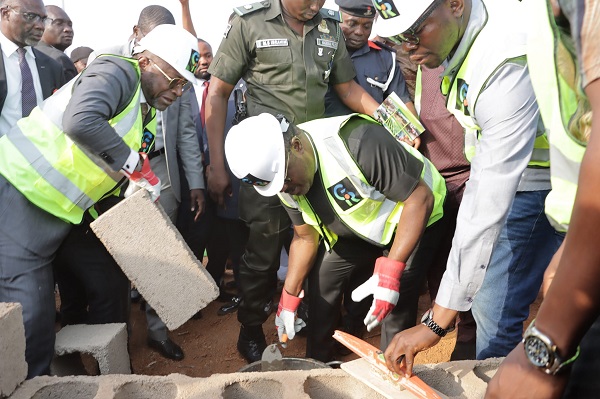…Agency poised to lead Nigeria’s industrial revolution – Prof. Haruna

The National Agency for Science and Engineering Infrastructure (NASENI) and the government of Cross River State have laid the foundation for NASENI’s new Agricultural Machinery and Equipment Development Institute (AMEDI) located in Obudu, Cross River State.
Speaking at the ground-breaking and foundation-laying ceremony yesterday (January 12, 2023) in Cross River, the executive vice chairman of NASENI, Prof. Mohammed Haruna reemphasised the commitment of the agency to lead Nigeria’s industrial revolution through the introduction of research and development of technology outcomes, leading to fabrication of machines, as well as the equipment and technology needs of the country to kick-start industrialisation.
Recall that President Muhammadu Buhari had approved six new agricultural machinery and equipment development institutes across the country, one per geo-political zone, in addition to six other industrial machinery and equipment development institutes also located in various geo-political zones of the country.
Haruna stated that the event was not only to lay the foundation of the institute but also an opportunity for NASENI to commend the Cross River State governor, Sen. Benedict Ayade for his unflinching support for NASENI and the relentless efforts to revolutionise agriculture in Cross River State, leadership and the general motivation which the governor gave other states on the need for the industrialisation of the country.
The NASENI boss remarked that the institute is no ordinary institute but one specialised in the research, development, manufacture and introduction of mechanised farming. He said farming and agricultural practice become easy with cultivation, planting and harvesting. The machines and equipment to be produced in the institute are expected to be high-tech, to make the people grow agricultural yields up to three times annually, unlike when farming is done only once so that the people can have increased harvests annually.
“Technology and the Internet of Things (IOT) are the basis, methods and instruments of modern farming beyond the use of hoes and cutlass and other ancient practices. From increased yields leading to high farming income to improved living conditions of practitioners, there is a need to adapt new farming implements and process and introduction of appropriate mechanisation. The level of improvement of the socio-economic life of the people is a direct consequence of their productivity or otherwise,” he explained.
The EVC said these technology gaps are those which the NASENI Agricultural Institute Obudu and other similar institutes in Lafia and Mbutu are expected to fill.
In his remarks, the president, Wildlife Society of Nigeria and the chairman of the occasion, Prof. Augustine Ogodo thanked President Buhari for returning the country to the path of genuine industrialisation with the establishment of six new AMEDIs.
He said the nation has no alternative than to return to agricultural mechanisation as the precursor for genuine industrialisation. He said it was no longer wise for Nigeria to continue to sell its products as raw materials to foreigners without value addition through the processing of raw materials into intermediate products, to bring higher income to agricultural practitioners.
Performing the foundation-laying ceremony, Ayade said: “Agro industries are the foundation of industrialisation and without agricultural development, such efforts will be hampered. In Cross River State, we have already started the industrial revolution,” he said.
He, however, commended NASENI for championing the churning out of machines, equipment and agricultural tools that are required to run a functional agricultural sector.
A statement by NASENI’s deputy director, information, Mr. Olusegun Ayeoyenikan, said about 500 NASENI ‘Save 80 Efficient Cooking Stoves’ were handed over to women in the state during the occasion. The environment-friendly stove is essentially to save the environment from deforestation and desertification. The products were also distributed to alleviate the sufferings of women in rural areas who could not afford the high costs of energy to prepare meals for their families.


